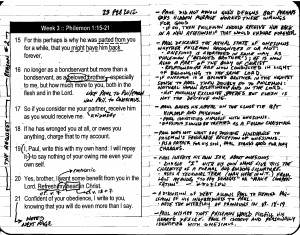I have been using the “memory moleskine” since I started with Philippians last year. Tim Brister’s idea revolutionized my thinking about Scripture memorization, and along the way, changed how I manage my private devotions.
My devotions over the years have always varied from hot to cold, working on something or doing nothing at all. I have used teaching Sunday school as a devotion of sort, yet I never really felt that lesson preparation should be my only devotion.
Now though, I am deliberately and systematically choosing what to memorize. In turn, I am choosing what to spend time on. The time spent focused on memorizing has also become time spent in study and worship.
With each passage in my “memory moleskine”, I read one to several commentaries about that passage. I take notes and look for links pointed out within the books. I seek out new applications and new means to draw nearer to Christ.
With our just finished study of Philemon, I used Peter O’Brien’s commentary to help me understand better Paul’s letter. The picture below is one page of how my notebook ended up looking. The entire notebook is also available.


